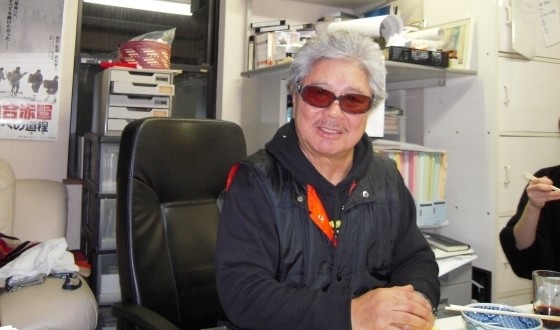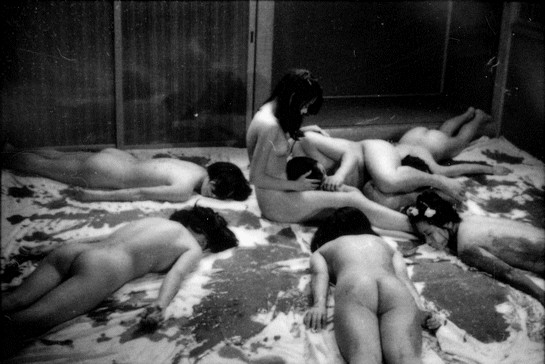
INTERVIEW WITH
KOJI WAKAMATSU
“It really is a great pity that my movies from the 60s have been the most noticed ones. I have also made plenty of interesting ones since then.”
Like many of your movies, Sex Jack shows your taste for “huis-clos” and delivers a claustrophobic atmosphere. Where does your interest in this kind of concept come from and is it an artistic choice or more of a cost-saving one? To name one example, the movie The Embryo Hunts in Secret was shot in my apartment. While working on it I was hallucinating on numerous occasions and thought I was going crazy. For my other film; Go, Go Second Time Virgin, we were shooting on the terrace of the building I was living in. I lived on the fifth floor and on the seventh there was this terrace which I often used to go up to, to watch the scenery. I thought to myself: “This would make an interesting shooting location”. Pictures would pop up in my head and soon afterwards the story was born. This is how I work with my script writers. One day, wandering around the desert with one of my writers, we came to the conclusion, that the idea of the desert as a closed room, a “huis-clos”, would be very interesting. While it might be true that this concept is the result of financial boundaries, it is also a product of my imagination. The Yosuke Yamashita Trio appears in a free-jazz sequence. Could you tell us about the role that jazz plays in your œuvre? The musicians with whom I worked were all unknown at that time. I often helped out at their concerts and while listening to their music, I started to feel a certain proximity towards certain musicians. I thought to myself, that they could able to deliver music that fit to my movies. So, I asked them to compose some pieces that I could use and they eventually did, delivering very good work. How were your films received in the West and was the reception any different to Japan? I don’t know why, but audiences in Europe and the USA, as opposed to Japan, watched my films without any discrimination. Actually, I don’t think much of critics, so naturally they don’t think much of me either. I don’t accept being judged by critics, who are unable (to make films) themselves. You have been labelled as an anti-capitalist. The characters in your movies however never follow any particular ideology, but are primarily in a state of protest. Do you define yourself as an anti-capitalist and what is your view on the ideologies of that time? I don’t know too much, but in Japan, the young people that revolted were all kids of rich parents. The children of poor families generally didn’t. That’s why my point of view is rather cold. In the 70s you stated a profound hate towards the Americans. Has your opinion changed since then? To this day I like the American people, but no other country has more blood on its hands than the United States. | |
 | Claustrophobic atmosphere in Inquisition of a Girl Saint (1981) | Like Violation of Thirteen, a lot of your work during the 70s consists of films that depict rape and extreme torture and are also far less political, but very aggressive and visceral. Do you feel close to that type of cinema? During that period I was constantly faced with house searches by the police and all the Japanese media talking bad about me. I was under pressure and not a single company dared to work with me. I had no other choice but to take the path of more commercial and mainstream cinema. Working on Serial Rapist I gave Masayuki Kakegawa, who was the lead actor and who is also a screenwriter, complete freedom. We wanted to make a movie that appealed to everybody. And indeed, people enjoyed it, but I don’t really understand why. You directed far less movies during the 80s. Was the crisis the Japanese movie industry was in the reason for that or was it because of weariness on your part? At that time, the authorities and media absolutely hated me. Being branded as ‘The Red Army’s Director ‘ meant getting work was almost impossible. I wasn’t even allowed to set foot on French territory. There’s a rumour that you worked with Takeshi Kitano at the end of the 60s... Apparently, Kitano was an extra in Go, Go, Second Time Virgin. At least that’s what he claims… I can’t think of any other movie he could have been in. I casted real vagabonds for that movie and at that time Kitano was a vagabond in Shinjuku. Do you see something like an heir in any director of modern Japanese cinema? We’re thinking about people like Takahisa Zeze. Many directors have seen my movies during their school or university days and it were my movies that made some of them want to become directors. Back then, it was impossible to become a director without an academic background. I was a Yakuza and had quit studying after the first year of high school. And still I managed to become a director anyway. I think I had an influence on 80% of today’s Japanese directors, not on an artistic level, but by showing them that there is a way to make a dream come true. Everybody can become a director, it’s all a matter of dedication and motivation. Your credo “Everybody can make movies” reflects in a way that of the Nouvelle Vague. Are you aware of the connection? I don’t know if it’s in relation to the Nouvelle Vague. All I see is that I was able to become a director. But of course that took me a certain amount of effort, especially since I’m not very intelligent. It is not enough to get on the train and fall asleep all the time. When I’m on the train I take a look at the people in front of me and I start thinking what that person’s life could be like, how his personality is or his job. This is how I live, 24/7. This is what I call an “effort”. |
 | Sex, Blood and Death in Violated Angels (1967) | Your movies in the 60s were auteur works as well as movies belonging to the erotic genre, an openly commercial one. Is this discrepancy a result of spontaneity or was this approach apart from that? I think that I was aware of my approach’s originality. I wanted at any cost to continue making films, even if I had to cheat certain people. As long as I didn’t commit any crimes, I had to continue. What are your cinematic influences? I hardly watch any movies, because I know in the first place, that they won’t give me any inspiration. Every individual is born with his own appearance, his own history and to his own universe. I can’t imitate that. And even though it’s Impolite to say, I don’t think other people’s movies are interesting. I watch television when I have nothing better to do. People send me a lot of video cassettes and DVDs, asking me to watch them, but I never do. It is their job to watch the movies. I have no need to. Your movies of the 60s are by far the most well-known. Does that bother you? What, according to you, are the films that are most representative of your style? It really is a great pity that my movies from the 60s have been the most noticed ones. I have also made plenty of interesting ones since then. However, I can’t say which are the most representative of my style, because I see all of them as my children: some are more gifted than the others. I don’t go all-out for every single one and if one “child” makes some money, the other one has financial problems. But that’s not the reason for me to make one or the other. I have more than 100 “children” and I killed the ones that I really disliked. The ones that have survived, I treat equally. In order to make a child with a woman, naturally, you have to go all-out, but sometimes that will result in a not too gifted child. |